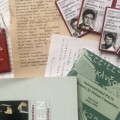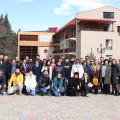The third article of the PEN Charter mentions peace, good understanding between nations, and respect. How realistic is this after the war?
Armenia and the Armenians were not aggressors, we favor peace and our part in the war was simply self-defense. In the past, relations with Turkey seemed realistic, Nobel laureate writers like Pamuk and Shafak were free to speak boldly, mentioning the mistakes of the government and their anti-Armenian policies. They were sincere enough to ask for forgiveness from the Armenians in front of the whole world. Despite being tolerant and peace-loving, the pain of loss that we feel right now is so big that I find it difficult to image where the abyss between the sides will grow narrow enough to rekindle a desire to build bridges.
What possible reflections on the war could find their way to our literature?
The basis for quality literature is pain and difficulty, but it is only during peacetime that writers can write about the pain they experienced during war. Literary masterpieces have been penned in times of peace.
Can writers use their words and their pens to start and succeed with a peace initiative? Will their words be understood and accepted?
The main and most important role of a writer is to be a peacemaker. Words are the most precious and powerful weapons. Writers’ words have been accepted in all times, and it is thanks to the power of those words that we have maintained our existence. I am of the conviction that it will always be this way.



